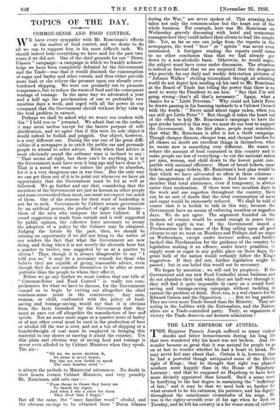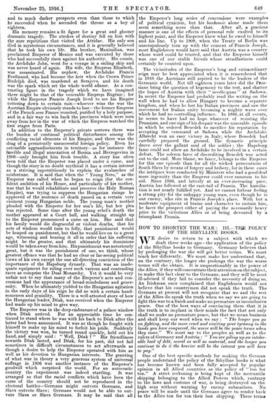THE LATE EMPEROR OF AUSTRIA. and to much darker prospects
even than those to which he succeeded when he ascended the throne as a boy of eighteen. His memory remains a fit figure for a great and gloomy dramatic tragedy. The strokes of destiny fell on him with the sure repetitions that visited the Atridae. His only son died in mysterious circumstances, and it is generally believed that he took his own life. His brother, Maximilian, was proclaimed Emperor of Mexico and was executed by those who had successfully risen against his authority. His cousin, the Archduke John, went for a voyage in a sailing ship and was never heard of again. His wife, the Empress Elisabeth, was assassinated. His nephew, the Archduke Francis Ferdinand, who had become the heir when the Crown Prince Rudolph died, was murdered at Serajevo, and his death was the spark which set the whole world aflame. As a con- trasting figure in the tragedy which we have imagined there might be that of the venerable Emprep Eugenie ; for while the Emperor Francis Joseph lived to see his Empire tottering down to certain ruin—whoever wins the war the Austrian Empire obviously stands to lose—the former Empress of the French sees France reunited, purified by a holy purpose, and in a fair way to win back the provinces which were torn away from her in the war of which the Empress watched the first stages from Paris. In addition to the Emperor's private sorrows there was the. burden of continual political disturbance among the conflicting racial elements of his Empire, and there was the drag of a persistently unsuccessful foreign policy. Even his ostensible aggrandisements in territory—as for instance the forcible and illegal annexation of Bosnia and Herzegovina in 1908—only brought him fresh trouble. A story has often been told that the Emperor was placed under a curse, and though the story is no doubt mythical it has a certain interest as a striving superstitiously to explain the avalanches of misfortune. It is said that when the " Young Nero," as the Emperor was called when he began to reign (for the con- fident ambition of his House, and particularly of his mother, was that he would rehabilitate and preserve the Holy Roman Empire), was trying to suppress the Hungarian risings he approved of the sentence of death passed on a certain very eminent young Hungarian noble. The young man's mother pleaded with the Emperor for her son's life, but her plea was rejected. Some time after the young rebel's death the mother appeared at a Court ball, and walking straight up to the Emperor pronounced a curse on him. She said that his family would die disgraceful or violent deaths, that his acts of wisdom would turn to folly, that punishment would be heaped on punishment, but that he would live on to a great age, witnessing and bearing it all in order that his suffering might be the greater, and that ultimately his dominions would be taken away from him. Hispunishment was notoriously great, but it was the punishment of one, we think, whose greatest offence was that he had no clear or far-seeing political views of his own except the one all-directing conviction of the importance of the Hapsburg dynasty. That was an inade- quate equipment for ruling over such various and contending races as comprise the Dual Monarchy. Yet it would be very unfair not to say that many of the Emperor's acts and con- cessions had the appearance of broad-mindedness and gener- osity. When he ultimately yielded to the Hungarian agitation in the early days of his reign he did so with a certain hand- someness and geniality. There is a well-attested story of how the Hungarian leader, Deak, was received when the Emperor had made up his mind to give way.
The Emperor was in the deep embrasure of a palace window when Desk arrived. For an appreciable time he con- tinued to stand where he was with his back to Deak after the latter had been announced. It was as though he fought with himself to make up his mind to forfeit his pride. Suddenly the victory was won, he turned round quickly, held out his hand, and simply said : " Well, Deak ? " His friendliness towards Desk lasted, and Deak, for his part, did not fail sometimes in difficult circumstances to act afterwards as though a desire to help the Emperor operated with him as well as his devotion to Hungarian interests. The granting of what was in theory a very generous system of universal suffrage in 1906 was another instance of the Emperor's goodwill which surprised the world. For an autocratic country the experiment was indeed startling. It was arranged so that the racial conflicts which have been the curse of the country should. not be reproduced in the electoral battles—Germans might outvote Germans, and Slays outvote Slays ; Germans would not be able to out- vote Slays or Slays Germans. It may be said that all the Emperor's long series of concessions were examples of political cynicism, but his bonhomie alone made them seem something more than that. After all, a gracious manner is one of the effects of personal rule exalted to its highest point, and the Emperor knew what he owed to himself and his line. Up to 1908, when the Treaty of Berlin was unscrupulously torn up with the consent of Francis Joseph, most Englishmen would have said that Austria was a country whose word could be trusted, and that the Emperor himself was one of our stable friends whose steadfastness could certainly be counted upon.
The vicissitudes of the Emperor's long and extraordinary reign may be best appreciated when it is remembered that in 1848 the Austrians still aspired to be the leaders of the Germanic world. Not till eighteen years later did the Prus- sians bring the question of hegemony to the test, and shatter the hopes of Austria with their " needle-guns " at Sadowa. In secret the Emperor had probably read the writing on the wall when he had to allow Hungary to become a separate kingdom, and when he lost his Italian provinces and saw the movement for Italian unity becoming a mighty wave over which he had no controlling influence. In 1866, at all events, he seems to have had no hope whatever of resisting the Prussians, and one sign of his despair was the miserable episode in which he ordered Benedek to sacrifice his reputation by accepting the command at Sadowa while the Archduke Albrecht won an easy victory in Italy, where Benedek had carefully prepared the ground. The dynastic principle drove over the gallant soul of the soldier ; the Hapsburg fame could not allow an Archduke to be involved in a certain defeat.. The solemn farce of discrediting Benedek was acted out to the end. More blame, we fancy, belongs to the Emperor for this one episode than for all the wicked persecutions of South Slays by means of forgery and bribery, for in these cases the intrigues were conducted by Ministers who had a good deal more ingenuity than the Emperor could ever summon to his aid. Since 1866, and latterly at an ever-increasing pace, Austria has followed at the cart-tail of Prussia. The humilia- tion is not nearly fulfilled yet. And we cannot forbear feeling a strong pity for the unhappy young man, even though he is our enemy, who sits in Francis Joseph's place. With but a moderate equipment of brains and character to sustain him, he faces the prospect either of paying the necessarily heavy price to the victorious Allies or of being devoured by a triumphant Prussia.



































 Previous page
Previous page